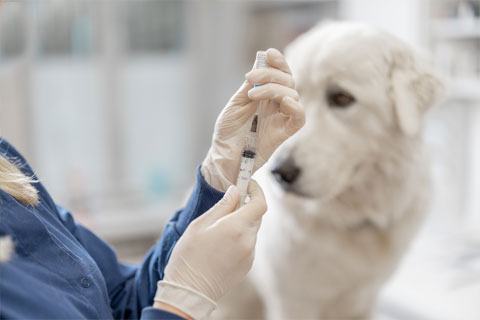The name parainfluenza may sound familiar because it is part of your dog’s regular distemper and parvo vaccine. This virus is also part of what is called (canine infectious respiratory disease complex), otherwise known as kennel cough.
Canine parainfluenza virus (CPIV) is a highly contagious RNA virus that causes respiratory disease worldwide. CPIV as part of kennel cough is commonly spread in group housing and social situations like dog parks and dog day care.
Dogs with CPIV may show no signs or exhibit a dry harsh cough for about 7 days, with or without fever and nasal discharge. However the virus also suppresses the immune system and causes loss of cilia and ciliated epithelium. These negative impacts of the virus makes coinfections more likely; and in some cases may lead to a pneumonia.
The incubation period for this virus is 3-10 days and patients can shed the virus for 6-8 days after infection. Therefore in an asymptomatic patient there could be viral shedding that was unexpected. The virus is easily killed with disinfectants, but can live on nonporous surfaces for 4-12 days.
The CPIV disease can be mostly prevented by vaccination. The vaccines are not 100 percent effective but clearly lessen the number of viral particles and hence the impact of the virus. As mentioned one form of the vaccine is injectable and often is included in the regular distemper and parvo vaccine. This vaccine stimulates systemic immunity and likely protects for less than 3 years. Since the distemper and parvo vaccine is given on a 3 year interval another complimentary vaccine should be considered.
For dogs that have social activity like a boarding facility, dog park, or dog day care the intranasal vaccine should be considered. This is an annual vaccine that incorporates both CPIV and the Bordetella respiratory pathogen. The vaccine is given as a single nose drop for each nostril; and stimulates mucosal immunity right at the level of the nose.
The combination of the injectable and intranasal vaccine provides the most robust immune response and is appropriate for dogs that have social opportunity.
CPIV is a worldwide pathogen that causes mild disease by itself, but can create weaknesses that allow more serious opportunistic pathogens to infect the respiratory tract. So check with your veterinarian for the best vaccine protocol for your pet.
On a side note, with this being the season for both fireworks and storms, be aware that many pets have serious anxiety issues related to these types of noises. Check with your veterinarian for suggestions to help and possibly medications to get through this tough time period.
